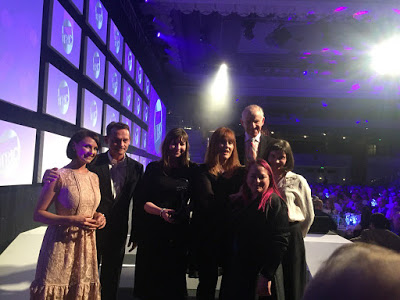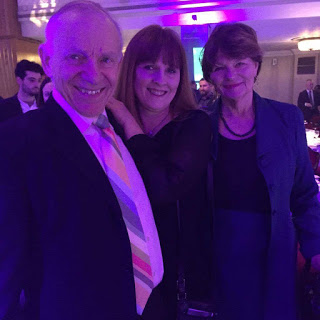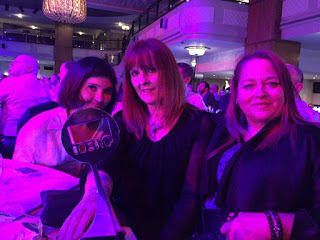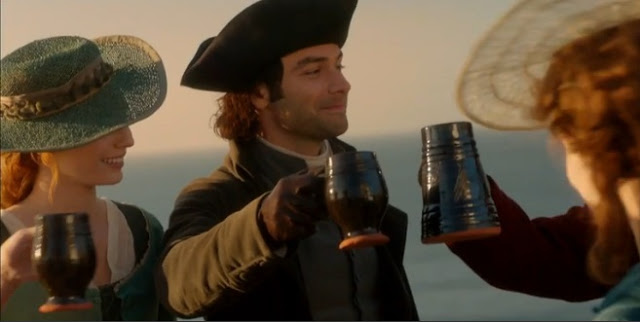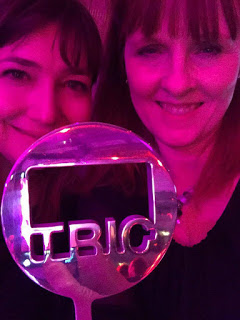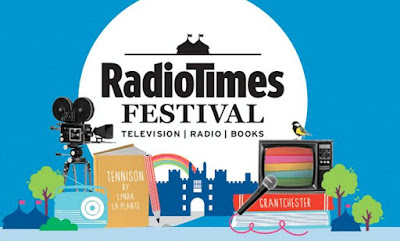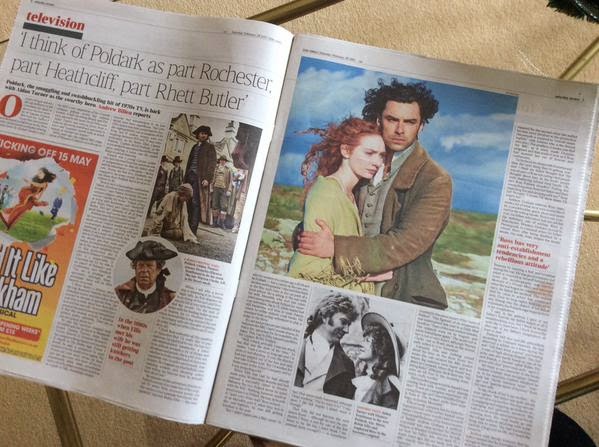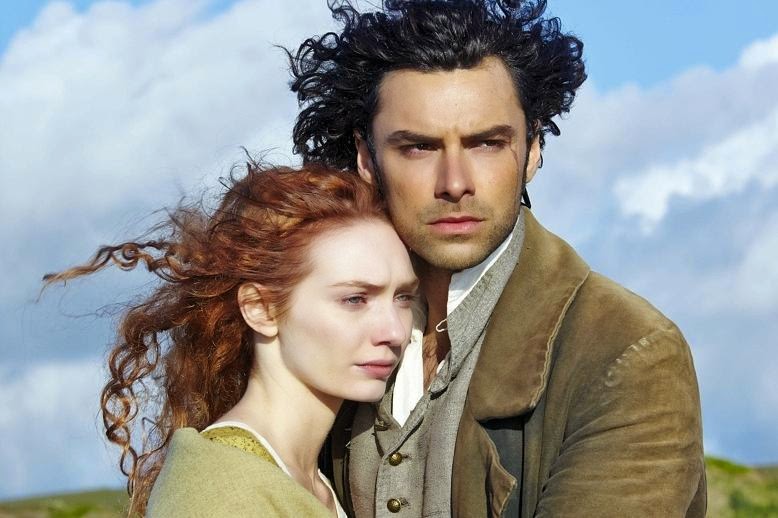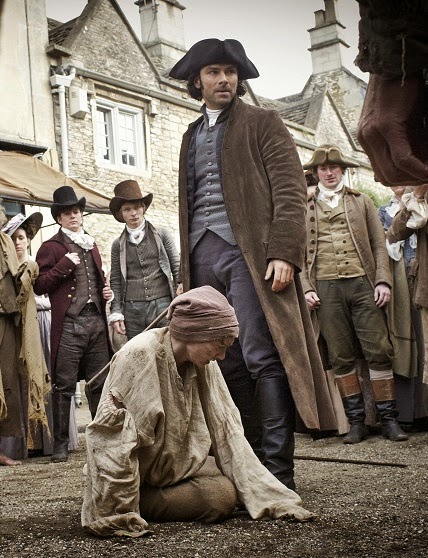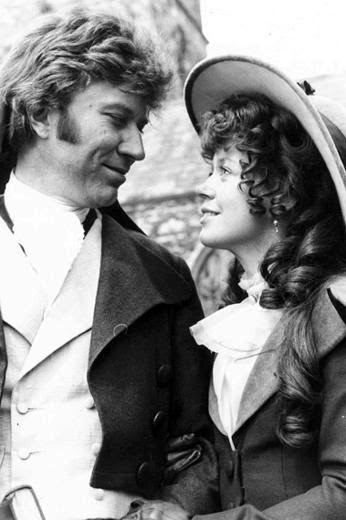By India Rose
At the Radio
Times Festival, Eric tent, there was high anticipation, as 'The Making of Poldark' hit the stage, fronted by producers Karen Thrussell and Damien
Timmer, writer Debbie Horsfield, and son of Winston Graham, Andrew Graham. The
panel was also joined by Ruby Bentall (Verity Poldark) and Beatie Edney (Prudie).
One of the first clips shown, almost predictably,
was that, somewhat infamous, scything scene. Questions followed, equally
predictably, on Aidan Turner's physique.
Damien Timmer on this matter: "It originally
wasn't a discussion about whether or not he would be shirtless... But then,
when he was, we did stop and think 'Blimey - he's so muscly'... There were
discussions about if he was too muscly."
Writer Debbie Horsfield had some interesting insights when asked - Did
you know it would be big?
"The amount of love and care you put into a show is the same
whether it's successful or not..." With producer Karen adding, "We
were completely taken by surprise... It was nerve racking every time...
Normally when a show goes out, you have to be begging for stories to go out
about it - but our publicist was fighting them off! Despite the fact it was
during the election."
Andrew Graham was asked about his reaction the first time around to
the 1970s adaptation. It was an extraordinary hit then, but he was, "surprised to
find it such a hit the second time." He then added "In regards
to what my father would think, 1) he would be delighted with the way Mammoth
treated it - would have loved the scripts - the publicity - but in terms of the
shirtless scene... He would think that it only works like it does because of
the story behind it, because it is a story of such romance and passion."
Who's idea was it to do it (Poldark) again?
"I kept saying," said producer
Timmer, "We should do a big Cornish saga... like Poldark... I kept
saying it. Then one day, I said... Why don't we do Poldark? So... We persuaded
Andrew it was a good idea to option the books - but then had them on the shelf
for 6 months while we plucked up the courage to take them to Debbie to ask her
to write it, who had never done an adaptation... We knew the idea of Debbie and
this saga - Poldark is the ultimate saga - would be brilliant. We knew
it."
Debbie Horsfield added: "It feels like in wonderful
collaboration with Winston. I was nervous to begin with - they are not my
characters…
But the moment I wrote the first line of non-Winston
dialogue - I knew I could do it. The books are incredibly modern, so... I
didn't have to invent them - they're already there."
Andrew Graham also gave insight into his father's work: "I think that it was during World War Two when he began to
conceive the Poldark novels. Everyone likes Poldark in Cornwall, in my
experience, because he painted it as it was, not as a novelist would."
Debbie agreed, mentioning in particular the controversial subject of wrecking in Cornwall’s history,
"We address that there was no wrecking - we cover that in the first
episode of series 2." Andrew then added that the people of Cornwall, as
well as his father, were adamant that there was no purposefully wrecking caused
by fishermen in Cornwall... But that, of course, if goods washed up on the
beaches, they would take them. "When Ross says that if the pilchards don't
come, the people will starve, he means it. They would starve.”
Debbie added, "We
address this from the last episode of Series 1 really... In the first draft, I
wrote what, ideally, I would have wanted for the scene--I
mean, in the book there are two wrecks coming in one after the other--but
there was no way our budget would allow for that. So, I took the script to the
production team and said, ‘This is in an ideal world - now we can
discuss what we can actually do’... So, in the end, I rewrote the whole
sequence so a lot of it is from Ross' perspective… I
deliberately rewrote it so its logistically achievable... I think we needed up
calling it "Hell on a beach", which you can see in the
sequence. Ross walks amongst people fighting, burning fires... I think it
worked out really well."
Jamaica Inn was then addressed - known on the Internet as #Mumblegate
- referring to when Jamaica Inn actors had been reported by audiences to be
mumbling their lines. Damien Timmer agrees instantly
"We were very paranoid about it, because we started shooting just a
week or so after that happened... We were very on it," with Karen adding,
"We had dialect coaches on set to look out for it.”
One audience member commented on his love for the compositions and
the music, and on that subject, Damien had this to say: "We spent a great many hours with [the composer] talking about
what the music for Poldark should be... What she came up with... We love it...
The thing about Poldark is that we, the people making it, are obsessed with it….
but especially our composer. She came to the read through just because she
wanted to hear the script, which never happens. She loves it that much. It's a
good job we all love it because it's so time consuming."
Debbie added how the musical element of the programme was important
to her as the writer: "We want to make sure the folk element was
important... So, even though the words are from the the novels, the melodies
were created... We made sure they were included... And Eleanor has such a
lovely voice. There will be lots more music in the second series, of
course."
When asked about the original series and why Winston Graham was
scathing of the 1970s version, Andrew was clear that his father did not agree
with changes that the BBC originally made, even adding, "He even tried to pull out of the contract a few weeks
before."
Producer Damien added, "It's ironic because you'd think in
the 21st century that producers would want to ‘sex up’ the series -
but in fact we wanted to scale it down… I don't know
why they felt to make those changes in the 70s."
Writer Debbie, when asked about if she had to add or change anything
about the characters to make them appeal to a 21st Century audience, had this
to say: "One of the challenges of a story that was written in the 40s,
but set in 18th Century, is that a lot of the conventions of that time are not
seen as acceptable in the 21st century... Elizabeth, we realised, can come
across as quite cold in the books, for example. When it was cut all together we
realised Elizabeth doesn't really punch through as a character. We kept
asking... What is it about her that Ross loves about her? Why does he love her
so much? Yes, she's his first love, but... We had to make her more proactive.
We thought an audience would be thinking "What on earth does he see in
her?" So, we gave her more depth, because that was the kind of this that
would therefore help appeal to a 21st Century audience.”
An exclusive video interview was played, as Aidan Turner was not
able to make it to the talk. He agreed to pre-record some answers. The best of
his answers, most definitely, had to be, when asked When did you know
[Poldark] was a mega-hit? the actor’s reply was “When
journalists started calling my mum.“
When asked if he had watched the original 70s version, Aidan had
this to say: “I could have… but I made a choice not to, very early on… I
just wanted to find my own Ross. I thought that might muck things up for me… It
probably wouldn’t have…and I don’t
why…” He then prompted added, “Laziness,” to laughs
from the room. “Of course I have… I’ve read the
books.” He looks earnest enough as he says this, but adds, “Twice,” and laughs.
The interviewer then asks, Are their changes for the characters
in the next series? Aidan responds dutifully. “There’s a
big journey for all the characters in the series. I think we cover about two
years in the series… There’s a lot of
places to go--and I know the books are out there--but I don’t
want to spoil anything…” The interviewer adds, But does
their [Demelza & Ross’] relationship change considering Ross was
in terrible trouble in the last episode?
Aidan: “Yeah the relationship does change, like every relationship changes.
You know, love changes. It evolves and progresses… There’s a
lot of…stuff…going on in the second series.”
When asked ‘Will there be anymore scything in the next
series?’, Aidan smirks and squirms, putting on an almost Ross Poldark voice
as he answers,
“I don’t know the answer to that one… I
suppose it depends how badly we need the ratings--God, what has
my life become?”
An exclusive clip from Series 2 was also played from last weeks on
location shoot in Cornwall --spoiler alert--
portraying a wary, ragged looking Demelza being hauled along by Ross' arm (”Ross,
no - I look like a ragamuffin!") and we soon
see that they are in fact meeting Ross' recently estranged cousin Francis where
he works in his wheat field, along with Elizabeth, their son, and other
labourers. They exchange pleasantries and the scene then depicts an ancient
Cornish harvest ceremony, as the first wheat sheath is collected.
What is most telling about this clip is that the dynamics between
the protagonists have very clearly shifted. The last time we saw Francis Poldark in Series 1, he had banished both Ross and Demelza from his life.
However, in this clip, he appears light and happy, now happy to work manual
labour alongside his men, something he had refused to do time and time again in
the first series. Demelza and Ross, however, appear off, almost like they had
just argued. As Ross gazes across the field as they enter, the camera shot that
follows is of an incredibly happy Elizabeth, waving to him - it becomes clear
that Elizabeth orchestrated the reunion - and while Ross' gaze remains fixed
forward, Demelza continues throughout the scene to gaze at him cautiously, as
though almost on the outside looking in, every time he interacts with
Elizabeth.
My personal favourite of these moments comes when he greets
Elizabeth with a kiss to her hand, his gaze appearing perhaps a little to intense
for someone who is not his wife, and all I could see in that shot was the
steely, side-glance from Demelza at his side.
The performances in this one small clip work wonders, and promise
the level of detail and emotional depth that has had us all hooked since the
beginning of Series 1.
The Radio Times Festival was brilliant from start to finish, and
hopefully they will continue this level of success next year and do it all
again. We can but hope!
